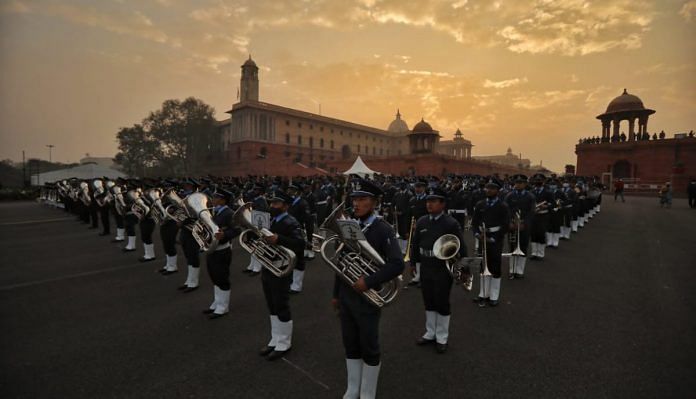New Delhi: ‘Abide With Me‘, the famous Christian hymn, has been dropped from the Beating Retreat ceremony, scheduled to be held on 29 January.
The iconic hymn, penned by Henry Francis Lyte in 1861 and set to tune by William Henry Monk, said to be a favourite of Mahatma Gandhi, has been traditionally played to conclude the annual 45-minute performance of military music, marking the last event of the Republic Day celebrations, at Vijay Chowk in New Delhi. The hymn has been used in the ceremony since 1950.
Replacing ‘Abide With Me‘ will be the soulful ‘Aye Mere Watan ke Logon‘, the patriotic song written by Kavi Pradeep, composed by C. Ramchandra, and memorably sung for the first time on Republic Day 1963 by Lata Mangeshkar.
“A decision was taken to include only Indian songs, since this retreat is a part of the Azadi ka Amrit Mahotsav celebrations. So, all tunes that will be played by the band will be Indian,” a sources in the defence establishment told ThePrint.
Beating Retreat signifies a military tradition dating back centuries, when troops stopped fighting, sheathed their arms, withdrew from the battlefield and returned to their camps at the sounding of the ‘retreat’. The ‘retreat’ was also sounded to recall patrolling units to their barracks.
In a press note issued Sunday, attributed to government sources, it was stated that the change is part of an ongoing exercise to change the colonial tunes adapted by the Indian Army.
It mentioned that the song ‘Aye Mere Watan ke Logon’ “evokes a strong sense of patriotism with all Indians” as the lyrics can be understood by all citizens. The note added that the new tune was a better representation of the valour of Indian soldiers who had laid down their lives in the service of the country.
Also read: Nearly 1,000 drones by IIT-Delhi startup to feature during Beating Retreat ceremony
Song list’s recent makeover
In 2020, as reported by ThePrint, there was speculation that the hymn may be dropped, to be replaced by Vande Mataram. However, no such decision was taken at the time.
The Narendra Modi government, in a bid to introduce Indian tunes and instruments, has been bringing changes to the list of tunes used on such state occasions.
The Beating Retreat ceremony in 2015 saw Indian classical instruments such as sitar, tabla and santoor make their debut.
In 2018, 25 of the 26 tunes used in the ceremony were composed by Indians. The only ‘English’ composition was ‘Abide With Me‘.
And, in 2019, Shankhanad, a tune composed by Tanuja Nafade, a professor from Nagpur, made it to the list of tunes to be played. The martial tune, composed for the Indian Army, is based on a poem written by Brig. Vivek Sohal. It was a meld of the ragas Bilaskhani Todi, Bhairavi and Kirvani.
‘Lyrics understood by limited few’
A note sent to the media, attributed to government sources, said the changes were part of an ongoing exercise to phase out tunes handed down from a colonial past and shift to tunes that have a wider and deeper connection with Indians.
The note stated, “’Abide with Me‘ is a popular military tune but the lyrics for this are understood by a limited few.” Adding that the new tune was patriotic and a better representation of India, the note read, “To commemorate the Swarnim Vijay Varsh and as part of Azadi ka Amrit Mahotsav, ‘Aye Mere Watan ke Logon‘ is being played instead of ‘Abide with Me.’
It went on to say that ‘Aye Mere Watan ke Logon’s’ “touching lyrics highlight the ‘Unity in Diversity’ aspect of the Indian soldiers and has a very mesmerising and solemn impact. The celebrated song has universal appeal and is an apt tribute to the brave soldiers of our Indian Armed Forces who have laid down their lives for our nation.”
Explaining the history of ‘Abide with Me‘, the press note also spoke about how it came to be played at an Indian Beating Retreat ceremony. The practice of Beating Retreat was begun by King William III of England in 1694. The Indian Republic Day parade was choreographed and adapted from the British pattern in 1952. The document explains how over the years Indian tunes have been added to the mix.
“Meanwhile in the Beating Retreat of 1955, mass singing of ‘Trahi Pahi Bharat Mata’ was an unusual innovation. The drums beating by mass drummers gave a spectacular climax to the programme. In 1979, all instruments played ‘Sare Jahan Se Achcha.’ Air and Navy also played ‘Jai Bharati’ during the ceremony. In 1984, the bands played ‘Swagatham’, composed by Pt Ravi Shankar for Asiad games.”
(Edited by Saikat Niyogi)
Also read: 5000-8000 visitors to be allowed at Republic Day parade, down from 25,000 last year



